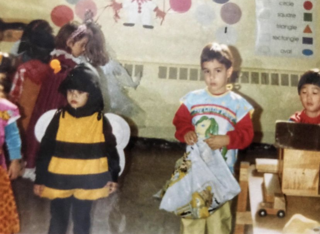Play
Intersectionality Allows for Healing, Honesty, and Diversity
Intersectionality is healing for all, therapists included.
Posted June 18, 2021 Reviewed by Gary Drevitch
Guest post by Peter Andrew Danzig (they/them), LSW, MSS, MA
“I noticed on your website it stays lover of unicorns,” says my client on a Saturday morning, my café con leche on my side table.
“Yes, it does. Why do you ask?”
“I felt like you were more than just a therapist, I felt like we can talk about anything. Unicorns are magical, and so is therapy I think.” I pause. I consider all the clinical implications of countertransference, use of self, ethics of self-disclosure. “Well, as a queer child, in the early eighties, my mother made sure to allow me to play with 'girl' toys; toys were just toys to her, nothing gendered about them. I loved My Little Pony, and although she worried about the ways the world can be cruel, she decided it was more important to allow me to be authentic. Those toys, my small Brooklyn room, they created a safe space where I could become who I was meant to be. It was a different time, but my mother made sure that I knew I was tougher than words or judgments from a young age.”
My client is still. Quiet. I wonder, was this helpful? My client, a non-binary, queer person looks at me and says, “I think I can tell you about my trauma, it feels safer knowing a bit about you."
Therapists, psychologists, and counselors often deal with a sense of hiding ourselves under the guise of ethics, managed care, psychopharmacology, theory, and psychology, and yet we forget that our intersections, our ability to see the many parts of us that make us unique, can allow for human connection in ways we never imagined—certainly not in our academic studies. There was a time, as a self-proclaimed Geek and pop culture fanatic, that I thought separating myself from that identity was the most helpful way to support my therapy clients—to be a clean slate, to model caring, humble, and open communication but to stay as neutral as possible. Yet, in the last two years of the pandemic, in considering my work as a Geek Therapist and Play Therapist treating trauma, I noticed something: Clients do not want Freudian theory or CBT alone; they want to sit with a complex human being, understanding complex emotions. It allows our complications to simplify one thing between us: our humanity and human need for diversity, equity, and inclusion.
I always keep professional boundaries — they are clinically relevant — but in Geek therapy, self-disclosure of our shared interests ensures our clients know that we understand the games, anime, TV shows, books, and geek references that are so pivotal to their healing — and sometimes, survival. As a Queer therapist and trauma survivor myself, I cannot imagine anything more polarizing than having a clinician who doesn’t take my interests in things like Sailor Moon, Buffy the Vampire Slayer, She-Ra and He-Man, and vintage My Little Pony seriously. It was those things that kept me safe, those characters, narratives, pudgy fanciful and playful ponies that lead to my childhood expression of my queerness, and also my disdain for toxic masculinity. When I felt most heard was when I knew there was a safe space to come home to. Not always do people have that, and for that I am grateful.
My client asks if they can know more about me. I let them know that over time, if it helps them, we can see where self-disclosure can help them feel safe and seen in session. I let them know “your therapy is the most important thing in this moment; this space can be a safe space for you to explore those emotions.” They look around, and notice my office décor does not reflect the candle-ridden, leather-couched, plant-filled rooms of most therapy offices. It has those things, yes, but also vintage toys next to books on IFS, CBT, and our complicated companion, the DSM. There’s even a vintage My Little Pony that I purchased at a toy show, encased in original packaging; my way of preserving the culture of my youth, and also a reminder that even we, yes, we therapists can show up in our office in a multitude of ways.
“Knowing that toys allowed you to explore as a kid helps; but what do you do now? To avoid the haters.” My client, 14 years younger than I, lives in a different world, one with a pandemic, and still lacking the same rights as our straight counterparts.
“Well, I didn’t stop exploring my interests. I don’t play with toys anymore, but I enjoy my geek interests and the geek community; I feel that I can be Peter the therapist, Peter the GenderQueer LatinX person with an invisible disability, and Peter the vintage toy collector. I think allowing myself to feel connected to the things that helped define my safety as a child allows me to advocate more strongly as an adult.”
Silence.
“Can you think of some ways that you can also find that strength?” I ask.
My client smiles. “I’m excited to think about it. Can I share something with you?”
“Yes. If you think it will be helpful.”
“I LOVE anime; there’s a moment in Sailor Moon where she says, 'I’m going to be my own kind of princess,' and I think I’d like to be my own kind of non-binary person.”
I smile. “That sounds like a good plan. When we return next week, maybe you can tell me more about what that list might look like. Would that be helpful?”
They smile. “Yes, thank you for being honest with me today.” After they leave, my usual flurry of process notes comes to a halt. I think about being a young child in Brooklyn on Halloween — the other children comfortable in their costumes, me feeling awkward. I choose instead a plastic costume that was more of a smock with a My Little Pony on it, no mask; nothing fancy. We financially didn’t have much as it was. I was nervous; I was different. I look over, and my mother is smiling. I look down at the My Little Pony on my costume and I feel stronger. I look up. I don’t need a mask, because my costume for the day is authenticity. I came as I was and left the same. Feeling like a unicorn, or maybe, my own kind of princess.

I like to think that those moments, those composites of childlike play, can help clinicians think about diversity, equity, and inclusion. How can we value our intersectionality in a way that helps our clients find relief and healing. Maybe it begins with us remembering something more magical than can be found in a diagnostic manual or screening criteria. So, I ask you, what was your magical world as a child? Can you find your way back sometime? It may just help the person sitting in your office find theirs.

Peter Andrew Danzig (they/them), LSW, MSS, MA is a therapist, researcher, and author. Their upcoming book, Don’t Toy with Me: A Geek Therapist’s History with Diversity, Equity, and Inclusion, will be published through Geek Therapeutics and Leyline Publishing. Learn more here.


